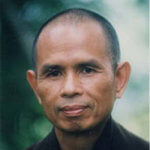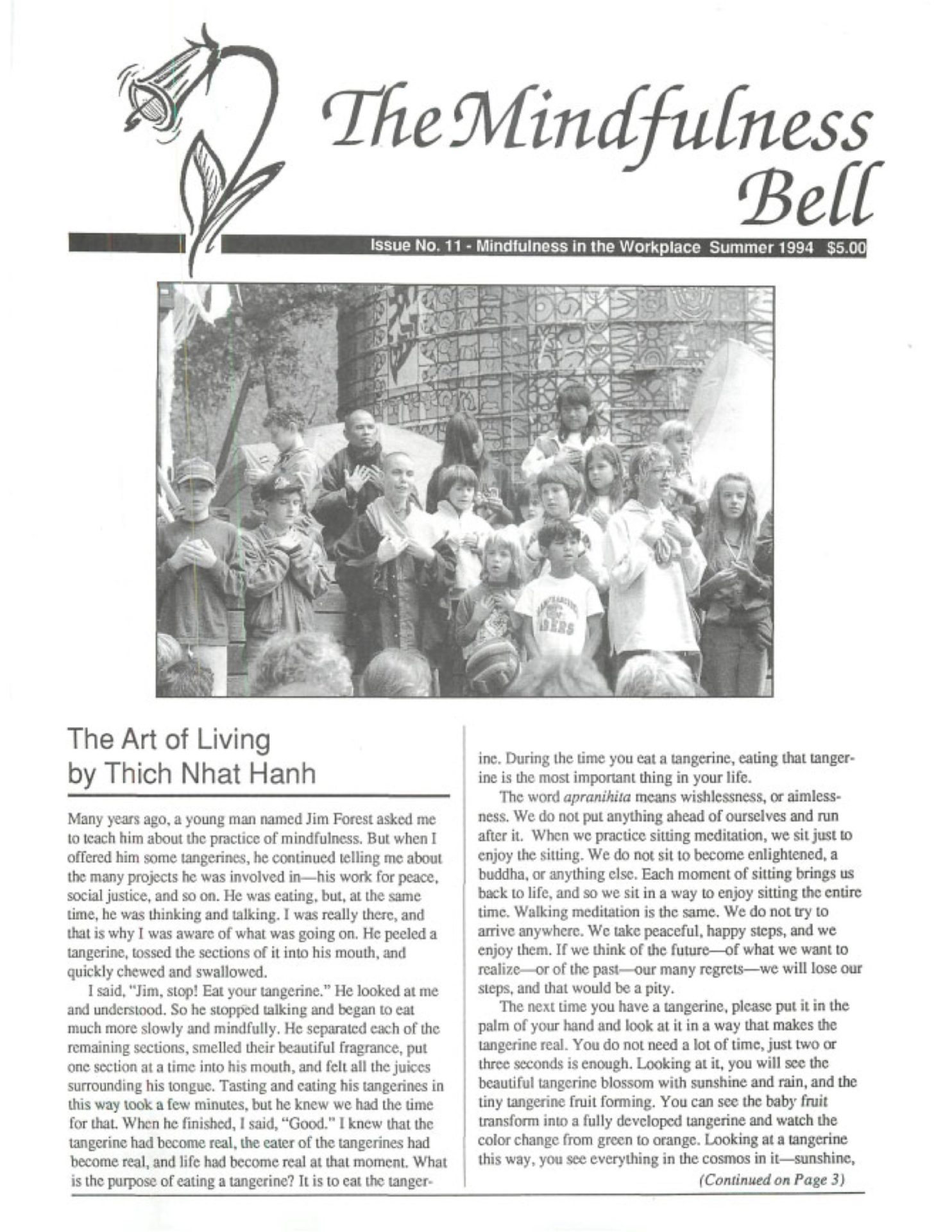By Thich Nhat Hanh in June 1994
Many years ago, a young man named Jim Forest asked me to teach him about the practice of mindfulness. But when I offered him some tangerines, he continued telling me about the many projects he was involved in — his work for peace, social justice, and so on. He was eating, but, at the same time, he was thinking and talking. I was really there,
By Thich Nhat Hanh in June 1994
Many years ago, a young man named Jim Forest asked me to teach him about the practice of mindfulness. But when I offered him some tangerines, he continued telling me about the many projects he was involved in — his work for peace, social justice, and so on. He was eating, but, at the same time, he was thinking and talking. I was really there, and that is why I was aware of what was going on. He peeled a tangerine, tossed the sections of it into his mouth, and quickly chewed and swallowed.

I said, "Jim, stop! Eat your tangerine." He looked at me and understood. So he stopped talking and began to eat much more slowly and mindfully. He separated each of the remaining sections, smelled their beautiful fragrance, put one section at a time into his mouth, and felt all the juices surrounding his tongue. Tasting and eating his tangerines in this way took a few minutes, but he knew we had the time for that. When he finished, I said, "Good." I knew that the tangerine had become real, the eater of the tangerines had become real, and life had become real at that moment. What is the purpose of eating a tangerine? It is to eat the tangerine. During the time you eat a tangerine, eating that tangerine is the most important thing in your life.
The word apranihita means wishlessness, or aimlessness. We do not put anything ahead of ourselves and run after it. When we practice sitting meditation, we sit just to enjoy the sitting. We do not sit to become enlightened, a buddha, or anything else. Each moment of sitting brings us back to life, and so we sit in a way to enjoy sitting the entire time. Walking meditation is the same. We do not try to arrive anywhere. We take peaceful, happy steps, and we enjoy them. If we think of the future — of what we want to realize — or of the past — our many regrets — we will lose our steps, and that would be a pity.
The next time you have a tangerine, please put it in the palm of your hand and look at it in a way that makes the tangerine real. You do not need a lot of time, just two or three seconds is enough. Looking at it, you will see the beautiful tangerine blossom with sunshine and rain, and the tiny tangerine fruit forming. You can see the baby fruit transform into a fully developed tangerine and watch the color change from green to orange. Looking at a tangerine this way, you see everything in the cosmos in it — sunshine, rain, clouds, trees, leaves, everything. Peeling the tangerine, smelling and tasting it, you can be very happy.
Everything we do can be like this. Whether planting lettuce, washing dishes, writing a poem, or adding columns of numbers, it is not different from eating a tangerine. All of these things are on equal footing. We can enjoy each task in the same way. One American woman told me, "You shouldn't waste your time growing lettuce. You should write more poems instead. Not many people write poems the way you do, but anyone can grow lettuce." That is not my way of thinking. I know very well that if I do not grow lettuce, I will not be able to write poems. Eating a tangerine, washing dishes, and growing lettuce in mindfulness are essential for writing poetry. The way we wash the dishes reveals the quality of our art.
After a retreat in Los Angeles, a painter asked me, "What is the best way to look at the moon and the flowers in order to use them in my art?" I replied, "If you think that way, you will not be in touch with the flower or the moon. Please give up your notions and just be with the flower with no intention of getting anything from it." He said, "When I am with a friend, I want to benefit from our friendship. Isn't it the same with a flower?" Of course, you can benefit from a friend, but a friend is more than a source of profit. Just to be with him or her is enough. We always want to do things in order to get something.
The practice of mindfulness is the opposite. We practice just to be. When we stop, we begin to see, and when we see, we understand. Peace and happiness are the fruit of that. In order to be with a friend or a flower, we need to learn the art of stopping.
How can we bring peace to a society that wants each activity to be a source of profit? How can a smile bring deep joy and not just be a diplomatic maneuver? When you smile to yourself, that smile is entirely different from a diplomatic smile. Smiling to yourself is proof that you are deeply at peace. We need to live in a way that demonstrates this, so that each moment of our life is a work of art, and we are pregnant with peace and joy for ourselves and others.
When we know how to be peace, the way we earn our living can be a wonderful means for us to express our deepest self. Our work will take place one way or another, but the being is essential. We must go back to ourselves and make peace with our anger, fear, jealousy, and mistrust. When we do this, we are able to realize real peace and joy, and the work we do will be of great help to ourselves and the world.
Each endeavor has techniques, but techniques are not enough. A young man in Vietnam wanted to learn how to draw lotus flowers, so he went to a master. The master just took him to a lotus pond and invited him to sit there. The young man watched one flower bloom when the sun was high, and he watched the flower return into a bud when night fell. The next morning, he practiced in the same way. When one flower wilted and its petals fell into the water, he looked at the rest of the flower and then moved on to another lotus.
After doing that for ten days, he went back to the master. The master asked, "Are you ready?" and he answered, "I will try." Then the master gave him a brush, and the lotus he drew was very beautiful. He had become a lotus, and the painting just came forth. You could see his naivete concerning technique, but real beauty was there.

The way we live our daily lives, whether we are mindful or not, has everything to do with peace. We try our best to have a job that is beneficial to humans, animals, plants, and the Earth, or at least minimally harmful. Jobs are hard to find, but if our work entails harming life, we should try to find another job. Our vocation can nourish our understanding and compassion or erode them. So many industries are harmful to humans and nature, even food production. The chemical poisons used by most modern farms do a lot of harm to the environment. Practicing right livelihood is difficult for farmers. If they do not use chemical pesticides, it may be difficult for them to compete commercially, so not many farmers practice organic farming. This is just one example.
Right livelihood has ceased to be a purely personal matter. It is our collective karma. Suppose I am a schoolteacher and I believe that nurturing love and understanding in children is a beautiful occupation. I would object if someone were to ask me to stop teaching and become, for example, a butcher. But when I meditate on the interrelatedness of all things, I can see that the butcher is not the only person responsible for killing animals. All of us who eat meat are co-responsible for his killing. We may think the butcher's livelihood is wrong and ours is right, but if we didn't eat meat, he wouldn't have to kill, or he would kill less. Right livelihood is a collective matter. The livelihood of each person affects us all, and vice versa. The butcher's children may benefit from my teaching, while my children, because they eat meat, share some responsibility for the butcher's livelihood.
Any look at right livelihood entails more than just examining the situation in which we earn our paycheck. Our whole life and our whole society are intimately involved. Everything we do contributes to our effort to practice right livelihood, and we can never succeed one hundred percent. But we can resolve to go in the direction of compassion, in the direction of reducing the suffering. And we can resolve to work for a society in which there is more right livelihood and less wrong livelihood.
Millions of people make their living in the arms industry, helping directly or indirectly to manufacture "conventional" and nuclear weapons. The U.S., Russia, France, Britain, China, and Germany are the primary suppliers of these weapons. So-called conventional weapons are then sold to Third World countries, where the people need food — not guns, tanks, or bombs. To manufacture or sell weapons is not right livelihood, but the responsibility for this situation lies with all of us — politicians, economists, and consumers. We all share responsibility for the death and destruction these weapons cause. We do not speak out. We have not organized a national debate on this problem. We have to examine and discuss this issue more, and we have to help create new jobs so that no one has to live on profits from weapons' manufacture. If you are able to work in a profession that helps realize your ideal of compassion, please be grateful. And please try to help create proper jobs for others by living mindfully — simply and sanely. Please use all your energy to try to improve the situation.
Photos: First photo by Gert-Ulrich Rump.Second photo by James Eggert.
To request permission to reprint this article, either online or in print, contact the Mindfulness Bell at editor@mindfulnessbell.org.


